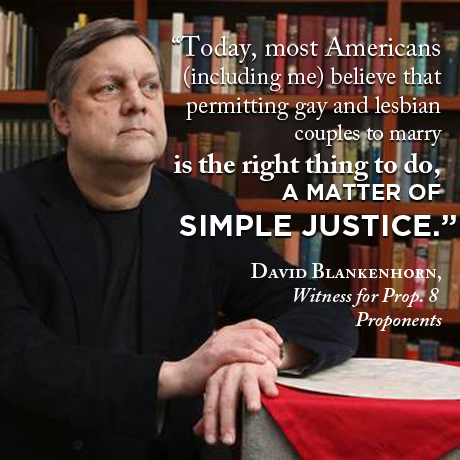Marriage News Blog

At one point, David Blankenhorn was one of the most vocal opponents of marriage for gay and lesbian couples. He was even called as the star witness in the 2010 Perry trial by the Proponents of Prop. 8. Last year, came out in support of marriage equality, and even helped defeat a constitutional ban on marriage for gay and lesbian couples in Minnesota.
Now in a Los Angeles Times Op/Ed, Blankenhorn makes the case for marriage equality and why supporting gay and lesbian Americans is the right thing to do.
A very few years ago, most Americans (including me) viewed the idea of gay marriage as both undesirable and wildly improbable. Today, most Americans (including me) believe that permitting gay and lesbian couples to marry is the right thing to do, a matter of simple justice.
Two dozen national polls now show that a majority of Americans, as much as 58 percent, support the freedom to marry for gay and lesbian Americans.
Blankenhorn attributes his change of heart to the personal friendship he forged with a gay couple, speaking to the importance personal conversations play with in changing hearts and minds about the issue.
In the end, I didn’t change my mind on gay marriage because I stopped believing in the importance of intact biological families. Nor was it because of new studies or additional facts. (Gay marriage still strains biological family bonds, although research also points to the potential stability of gay marriage and family structures.) And I didn’t change my mind because I got tired of being criticized. I changed my opposition to gay marriage because of personal relationships.
In my case, it began with the writer Jonathan Rauch, who I’d been publicly debating on the gay marriage issue. But at some point we stopped debating and started talking about our lives, including about my wife, Raina, and his husband, Michael. Did Jonathan’s marriage threaten the idea of marriage? Perhaps in theory. But in real life, was I able to see it? No. In fact, quite the opposite.
It may sound trite, but for me the key was the gradual breakthrough of empathy. I found that as friendships develop, empathy becomes at least possible, no longer kept at bay by a wall of fixed belief. Put simply, becoming friends with gay people who were married or wanted to get married led me to realize that I couldn’t in good conscience continue to oppose it.
